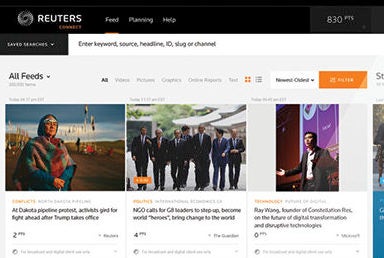
A year on since launching its hub for news content, Reuters Connect has revealed some of the trends in how news organisations are using the service and what this means for the wider industry.
Since is launch in May last year, Connect now has 14m pieces of content – from breaking news and video to archive images. It provides a one-stop shop for news organisations hungry for content.
Video is “alive and well”, according to Sue Brooks, global head of product at Reuters.
Reuters now publishes around 700 live feeds a month – up to six at a time – through Connect, which is designed so live coverage can be streamed to television, websites and social media platforms in a simple workflow.
She said the number of live video streams used by news organisations signed up to Connect had doubled on last year, when the service was still available but not through the new hub format.
She said 60 per cent of that growth had taken place in the past three to four months.
“The pivot to video is alive and well,” said Brooks.
“What we are seeing though is that people are experimenting with the format. It was the perceived wisdom that TV online doesn’t work and I think by and large that’s still true, unless you have a lot of money to throw at it.”
There has been a noticeable difference, she said, between the content downloaded from Reuters Connect by digital publishers, who want events they can anticipate and build up to, and broadcasters, who need more action-oriented footage.
Brooks said: “What we are seeing is that online and digital customers like advanced notice, they like planned events, because our customers can then build a page around it and advertise around it.”
Brooks could not reveal specific customers, but said most of the UK national daily newspapers now regularly use Reuters video.
The top performing live feeds for broadcasters were an attack in Afghanistan and Vladimir Putin’s election concert, while the most used on digital were the January lunar eclipse, SpaceX rocket launch, Donald Trump’s appearance at the World Economic Forum in Davos and a NASA space walk.
Reuters product manager Tessa Kaday said live breaking news feeds are “surprisingly unsuccessful” on digital, adding: “It’s a really different art. You need to build the audience and give them a reason to stay and keep watching. They are less patient than people watching on TV.”
Brooks also noted the Washington Post’s coverage of Facebook chief executive Mark Zuckerberg’s recent Congress hearing, saying: “Their output was like watching a TV channel.
“It was absolutely perceived wisdom up until recently that replacing TV online did not work, that online was its own thing and therefore you had a different relationship with the screen and that’s still true to some extent but there are some newspapers which are pushing that and creating TV-like experiences.”
She added: “It’s the difference between the two we are seeing for the first time. This information flows back to the newsroom so we can better prepare and know what to look for, what kind of thing is working and respond to the trends because we can have all the data in the world but so what – is it going to change behaviour? We want to be data informed rather than data led.”
The data shows that convergence in journalism – the trend of using two or more mediums in one newsroom, which might traditionally have focused on one type of content (e.g. print) – is here, Brooks said.
She said Connect had seen broadcasters begin to use more still images as they became more easily downloadable alongside video, and digital publishers increasingly use all different types of content at once.
For example, 75 per cent of Reuters customers who only previously had subscription access to video are now using multi-media content like photos and graphics.
Other trends are just beginning to emerge. Brooks recently spotted that in each of the past few weeks Wednesday was the busiest news day of the week, according to the number of downloads from Reuters Connect.
This is a theory Reuters can now monitor and respond to with its distribution of resources if the pattern continues.
Brooks said the global nature of the business meant it was unlikely to be skewed by UK events, such as Prime Minister’s Questions in Parliament.
“We don’t know [why it might be]. We are just going to watch it and see if we can prove Wednesdays are a really good news day,” she said.
Less surprisingly, the data has proved that weekends are a less busy time, with many online news organisations working on reduced staffing.
Realising the extent of this has led Reuters to prepare more “evergreen” lifestyle and features content on Thursdays and Fridays which can help publishers last through the weekend.
Reuters Connect has also seen an increase in partner content from the likes of the BBC, USA Today, Africa 24, and more specialist publishers like Variety, being used.
Brooks said this enabled partners to leverage Reuters’s global audience to distribute and sell their own content, adding: “We can work together – that is the ethos and the vision behind it.”
Email pged@pressgazette.co.uk to point out mistakes, provide story tips or send in a letter for publication on our "Letters Page" blog
